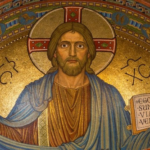We run our website the way we wished the whole internet worked: we provide high quality original content with no ads. We are funded solely by your direct support. Please consider supporting this project.

5 Ways the Bible Supports Open Theism
Open Theism refers to the belief that God created a world in which possibilities are real. It contrasts with Classical Theism which holds that all the facts of world history are eternally settled, either by God willing them so (as in Calvinism) or simply in God’s knowledge (as in Arminianism). Open Theists believe God created humans and angels with free will and that these agents are empowered to have “say so” in what comes to pass. In Open Theism, therefore, what people decide to do genuinely affects God and affects what comes to pass. In particular, by God’s own sovereign design, things really hang on whether or not God’s people pray.
The primary reason Open Theists believe what they do is because they find that Scripture presents the future as partly open. While there are certainly passages that depict God predetermining and foreknowing some aspects of the future, there are at least as many passages depicting God as facing a future partly comprised of possibilities. A small sampling of these sorts of passages are the following:
- The Lord frequently changes his mind in the light of changing circumstances, or as a result of prayer (Exod. 32:14; Num. 14:12–20; Deut. 9:13–14, 18–20, 25; 1 Sam. 2:27–36; 2 Kings 20:1–7; 1 Chron. 21:15; Jer. 26:19; Ezek. 20:5–22; Amos 7:1–6; Jonah 1:2; 3:2, 4–10). At other times he explicitly states that he will change his mind if circumstances change (Jer. 18:7–11; 26:2–3; Ezek. 33:13–15). This willingness to change is portrayed as one of God’s attributes of greatness (Joel 2:13–14; Jonah 4:2). If the future were exhaustively and eternally settled, as classical theism teaches, it would be impossible for God to genuinely change his mind about matters.
- God sometimes expresses regret and disappointment over how things turned out—even occasionally over things that resulted from his own will. (Gen. 6:5–6; 1 Sam. 15:10, 35; Ezek. 22:29–31). If the future was exhaustively and eternally settled, it would be impossible for God to genuinely regret how some of his own decisions turned out.
- At other times God tells us that he is surprised at how things turned out because he expected a different outcome (Isa. 5:3–7; Jer. 3:6-7; 19–20). If the future were eternally and exhaustively settled, everything would come to pass exactly as God eternally knew or determined it to be.
- The Lord frequently tests his people to find out whether they’ll remain faithful to him (Gen. 22:12; Exod. 16:4; Deut. 8:2; 13:1–3; Judges 2:20–3:5; 2 Chron. 32:31). If the future were eternally and exhaustively settled, God could not genuinely say he tests people “to know” whether they’ll be faithful or not.
- The Lord sometimes asks non-rhetorical questions about the future (Num. 14:11; Hos. 8:5) and speaks to people in terms of what may or may not happen (Exod. 3:18–4:9; 13:17; Jer. 38:17–18, 20–21, 23; Ezek. 12:1–3). If the future were exhaustively and eternally settled, God could never genuinely speak about the future in terms of what “may” or “may not” happen.
So the Bible presents God as interacting with a world that is moving into a partly open future. This doesn’t mean that God could ever be caught off guard or that his overall purposes for the world are ever threatened. Because they believe God is infinitely intelligent, Open Theists affirm that God anticipates each and every possibility from the foundation of the world, as though it were a certainty. Whatever comes to pass, God has a plan in place to respond to it, bringing good out of evil when this is necessary. But, unlike Classical Theists, Open Theists are confident that God is so smart, he can sovereignly rule the world effectively without needing to have everything pre-settled in his will or mind ahead of time.
__
art: “Trees by the Gein at Moonrise
by: Piet Mondrian
date: 1907 – 1908
Category: General
Tags: Arminianism, Bible, Calvinism, Free Will, Open Theism
Topics: Defending the Open View
Related Reading

How can you put your trust in a God who’s not in control of everything?
Question: I read your book Is God to Blame? and found it to be very compelling. It’s rocking my world. But I’m also finding I’m now having trouble trusting God like I used to. I used to believe that God ordained or at least foreknew all that was going to happen. Now I’m questioning this, and I’m wondering…

Dealing With Objections to Open Theism, Part I
There are four major objections to Open Theism. Today we will deal with the first two and then tomorrow the third and fourth. For a basic introduction to Open Theism, click here. Objection #1: The open view denies omniscience. It is often argued that the open view denies the omniscience of God, even saying things…

Jesus is the Center of the Story
The previous post addressed how the revelation of Christ is the surprising twist that reframes how we must read all that precedes it. Today we’ll look briefly at five supports to this claim. Jesus said, “I have a testimony greater than that of John” (John 5:36). Jesus elsewhere claims that “among those born of women…

What is the significance of 1 Samuel 13:13–14?
Because of Saul’s rebellion, Samuel tells him, “The Lord would have established your kingdom over Israel forever but now your kingdom will not continue.” The biblical narrative depicting God’s dealings with Saul up to this point is predicated on the assumption that God intended to establish Saul’s descendants as the permanent heir to the throne…

When God Needs an Intercessor
In the previous two posts, we have been exploring biblical narratives that point to how God’s knowledge is temporally conditioned and thus supports an open view of the future, or open theism as it is commonly called. The first addressed how God regrets and the second how God discovers. In this post, I want to…

Podcast: If Jesus is the Word of God, Why Call the Bible the Word of God?
Stories and words and Bible nerds. http://traffic.libsyn.com/askgregboyd/Episode_0459.mp3
